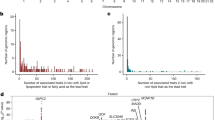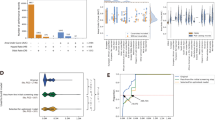Abstract
Clinically similar asthma patients may develop airway obstruction by different mechanisms1,2. Asthma treatments that specifically interfere with the 5-lipoxygenase (ALOX5) pathway3,4,5 provide a method to identify those patients in whom the products of the ALOX5 pathway (that is, the leukotrienes) contribute to the expression of the asthma phenotype. Failure of an asthma patient to respond to treatment with ALOX5-pathway modifiers indicates that leukotrienes are not critical to the expression of the asthmatic phenotype in that patient. We previously defined a family of DNA sequence variants in the core promoter of the gene ALOX5 (on chromosome 10q11.2) associated with diminished promoter-reporter activity in tissue culture6,7. Because expression of ALOX5 is in part transcriptionally regulated8, we reasoned that patients with these sequence variants may have diminished gene transcription, and therefore decreased ALOX5 product production and a diminished clinical response to treatment with a drug targeting this pathway. Such an effect indicates an interaction between gene promoter sequence variants and drug-treatment responses, that is, a pharmacogenetic effect of a promoter sequence on treatment responses.
This is a preview of subscription content, access via your institution
Access options
Subscribe to this journal
Receive 12 print issues and online access
$209.00 per year
only $17.42 per issue
Buy this article
- Purchase on Springer Link
- Instant access to full article PDF
Prices may be subject to local taxes which are calculated during checkout

Similar content being viewed by others
References
Barnes, P.J. Drug therapy: inhaled glucocorticoids for asthma. N. Engl. J. Med. 332, 868–875 (1995).
Lemanske, R.F. & Busse, W.W. Asthma. JAMA 278, 1855–1873 (1997).
Busse, W.W. Leukotrienes and inflammation. Am. J. Respir. Crit. Care Med. 157, S210–S213 (1998).
Drazen, J.M., Israel, E. & Obyrne, P.M. Treatment of asthma with drugs modifying the leukotriene pathway. N. Engl. J. Med. 340, 197–206 (1999).
Obyrne, P.M., Israel, E. & Drazen, J.M. Antileukotrienes in the treatment of asthma. Ann. Intern. Med. 127, 472–480 (1997).
In, K.H. et al. Naturally occurring mutations in the human 5-lipoxygenase gene promoter that modify transcription factor binding and reporter gene transcription. J. Clin. Invest. 99, 1130–1137 (1997).
Silverman, E.S. et al. Egr-1 and Sp1 interact functionally with the 5-lipoxygenase promoter and its naturally occurring mutants. Am. J. Respir. Cell Mol. Biol. 19, 316–323 (1998).
Stankova, J., Rolapleszczynski, M. & Dubois, C.M. Granulocyte-macrophage colony-stimulating factor increases 5-lipoxygenase gene transcription and protein expression in human neutrophils. Blood 85, 3719–3726 (1995).
Mcgill, K.A. & Busse, W.W. Zileuton. Lancet 348, 519–524 (1996).
Schwartz, H.J., Petty, T., Dube, L.M., Swanson, L.J. & Lancaster, J.F. A randomized controlled trial comparing zileuton with theophylline in moderate asthma. Arch. Intern. Med. 158, 141–148 (1998).
American Thoracic Society. Standards for the diagnosis and care of patients with chronic obstructive pulmonary disease (COPD) and asthma. Am. Rev. Respir. Dis. 136, 225–244 (1987).
Wong, S.L. et al. Pharmacokinetics and pharmacodynamics of single and multiple oral doses of a novel 5-lipoxygenase inhibitor (ABT-761) in healthy volunteers. Clin. Pharmacol. Ther. 63, 324–331 (1998).
Wong, S.L. et al. Pharmacokinetics of a novel 5-lipoxygenase inhibitor (ABT-761) in pediatric patients with asthma. Eur. J. Clin. Pharmacol. 54, 715–719 (1998).
Barnes, P.J. Neuropeptides in human airways: function and clinical implications. Am. Rev. Respir. Dis. 136, S77–S83 (1987).
Smith, L.J. The role of platelet-activating factor in asthma. Am. Rev. Respir. Dis. 143, S100–S102 (1991).
Wenzel, S.E., Fowler, A.A. & Schwartz, L.B. Activation of pulmonary mast cells by bronchoalveolar allergen challenge. In vivo release of histamine and tryptase in atopic subjects with and without asthma. Am. Rev. Respir. Dis. 137, 1002–1008 (1988).
Nadel, J.A. & Caughey, G.H. Roles of mast cell proteases in airways. Chest 95, 1328–1330 (1989).
Nebert, D.W. & Weber, W.W. Pharmacogenetics. in Principles of Drug Action: The Basis of Pharmacology (Churchill Livingston, New York, 1990).
Meyer, U.A. & Zanger, U.M. Molecular mechanisms of genetic polymorphisms of drug metabolism. Annu. Rev. Pharmacol. Toxicol. 37, 269–296 (1997).
Carson, P.E., Flangan, C.L., Ickes, C.E. & Alving, A.S. Enzymatic deficiency in primaquine sensitive erythrocytes. Science 124, 484–485 (1956).
Poort, S.R., Rosendaal, F.R., Reitsma, P.H. & Bertina, R.M. A common genetic variation in the 3´-untranslated region of the prothrombin gene is associated with elevated plasma prothrombin levels and an increase in venous thrombosis. Blood 88, 3698–3703 (1996).
Arranz, M. et al. Association between clozapine response and allelic variation in 5- HT2A receptor gene. Lancet 346, 281–282 (1995).
Kuivenhoven, J.A. et al. The role of a common variant of the cholesteryl ester transfer protein gene in the progression of coronary atherosclerosis. The Regression Growth Evaluation Statin Study Group. N. Engl. J. Med. 338, 86–93 (1998).
Hancox, R.J., Sears, M.R. & Taylor, D.R. Polymorphism of the β(2)-adrenoceptor and the response to long-term β(2)-agonist therapy in asthma. Eur. Respir. J. 11, 589–593 (1998).
American Thoracic Society. Standardization of spirometry—1987 update. Am. Rev. Respir. Dis. 136, 1285–1298 (1987).
Acknowledgements
This study was supported by grants from Abbott Laboratories and the United States National Heart, Lung and Blood Institute (P50-HL-56383).
Author information
Authors and Affiliations
Corresponding author
Rights and permissions
About this article
Cite this article
Drazen, J., Yandava, C., Dubé, L. et al. Pharmacogenetic association between ALOX5 promoter genotype and the response to anti-asthma treatment. Nat Genet 22, 168–170 (1999). https://doi.org/10.1038/9680
Received:
Accepted:
Issue Date:
DOI: https://doi.org/10.1038/9680
This article is cited by
-
Phosphorylation of 5-LOX: The Potential Set-point of Inflammation
Neurochemical Research (2020)
-
Asthma phenotypes: the intriguing selective intervention with Montelukast
Asthma Research and Practice (2016)
-
Genome-wide association study of leukotriene modifier response in asthma
The Pharmacogenomics Journal (2016)
-
CRHR1 Gene SNPs and Response to Systemic Corticosteroids in Indian Asthmatic Children During Acute Exacerbation
The Indian Journal of Pediatrics (2015)
-
LTC4 synthase polymorphism modifies efficacy of botanical seed oil combination in asthma
SpringerPlus (2014)



